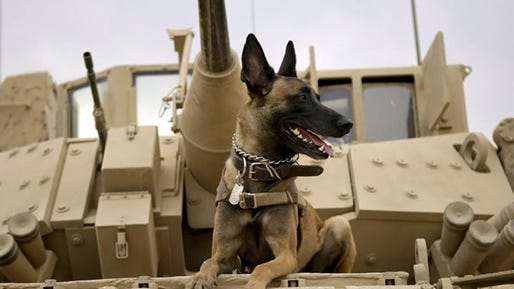Max

Plenty of pooches get skittish this time of year, seeking shelter from the sharp, sudden clap of booming fireworks. Truthfully, the scariest thing most of those pets have encountered is an empty water bowl. Imagine, then, the magnitude of terror felt by a military dog equating that sound with detonated explosives, the death of his handler and a seemingly irreversible inability to perform the duties that define him.
In its finest moments, “Max” gives serious consideration to post-traumatic stress disorder as the high cost of service for soldiers of any species. Watching the titular Belgian Malinois — among the hardest breeds to train, but fiercely intelligent — struggling to piece together his personality and purpose makes for moments of powerful, understated poignancy. But by trying to sharpen its edges where sincere empathy suits it fine, “Max” swerves its story in the worst possible direction.
Co-writer / director Boaz Yakin — of “Remember the Titans” fame and owner of one of modern Hollywood’s weirdest filmographies — and co-writer Sheldon Lettich (a longtime Jean Claude van Damme collaborator maintaining his death grip on ’80s cheese here) spin this admirably simple, sincere story out into a laughably outlandish action-thriller in which Max takes on rogue U.S. Marines, small-town Texas cops and Mexican gangsters running Taliban guns. When “Max’s” unending, uninvolving and utterly preposterous third act begins, that trail of unique charms is long lost.
A prologue cites the use of 3,000 dogs in Iraq and Afghanistan as a modern-day application of an American military tactic used since World War I. Shortly after discovering a hidden weapons cache (not unlike Chris Kyle in “American Sniper”) Max suffers the aforementioned accident and is shipped home to the Texas town where his late handler, Kyle Wincott (Robbie Amell), lived.
Kyle’s father, Ray (Thomas Haden Church) is a hardened veteran, hobbled in leg and heart by a crippling wartime injury, and his mother, Pamela (Lauren Graham) finds little reminders of loss everywhere she turns. Younger brother Justin (Josh Wiggins) has become a saturnine, slouchy teen at odds with his parents since Kyle deployed.
They’re hardly ideal caretakers for Max, but they turn out to be his only option. No longer able to serve his military mission and considered a danger to everyday society, Max will be put down if the Wincotts don’t take him. So he becomes a character-building project for Justin, the only person at whom Max doesn’t immediately lunge and snap.
Crossing “Critters 3”-era Leonardo DiCaprio with the stilted smart-ass apathy of Jesse Eisenberg, Wiggins lends gravity to the way Justin draws down his own defensiveness in the wake of Max’s misery. Kudos, too, to exceptional handling of the six dogs who play Max. The moment when Justin realizes the weight of Max’s PTSD — and the unlikely pair of friends reaches a place of mutual respect and regard — is a high point for both the human and canine actors involved.
From there, however, “Max” is almost all low points, and not for reasons you might expect. Brazen manipulation or blind jingoism is mercifully absent. “Max” acknowledges the cynicism and weariness of war without overstating either one. What neuters “Max” is an abandonment of common sense, awkward cinematography and just plain sloppy storytelling.
Jay Hernandez turns up a helpful Marine sharing all manners of privileged, and helpful, information with Justin … whom Justin abandons as a credible witness when he needs him most. Cinematographer Stefan Czapsky employs handheld zooms for homefront tension with all the grace of a drunkard careening into the camera. He shoots another scene, pointlessly, from behind a moving fan.
Later, the bad guys — with two tires blown out — seem to swap them for fresh wheels with the speed and efficiency of NASCAR’s finest pit crew. Cell phones work magically after being submerged in rivers. Trevor Rabin’s syrupy score remains jaunty even during a violent hostage situation. Plus, “Max” condemns, then asks you to more or less cheer for, unexpectedly vivid dogfighting.
What’s most frustrating is that, ultimately, you realize that Yakin and Lettich could have more believably thrown Max into this caper by having him retrain as a police dog. (No surprise: Every cop in this movie is either dirty or a doofus.) That would have also given us more time to watch Max painstakingly readjust to the reality of civilian life.
This notion fuels the other excellent moment in “Max,” as Ray reveals to Justin the reason for his reticence. It shows you first what an Oscar nominee like Church might have seen in this story. But the scene also suggests how easy it becomes for us to accept preferably unchallenging “heroic” versions of our soldiers’ stories … and why it’s important to acknowledge harder truths about what we demand of them and the toll it takes. If only “Max” had taken that to heart and stuck to its guns rather than draw them and fire away.
